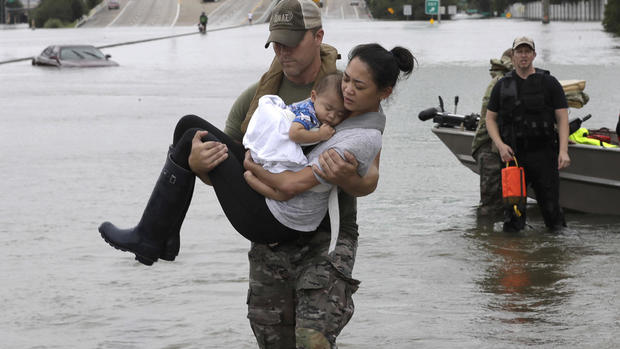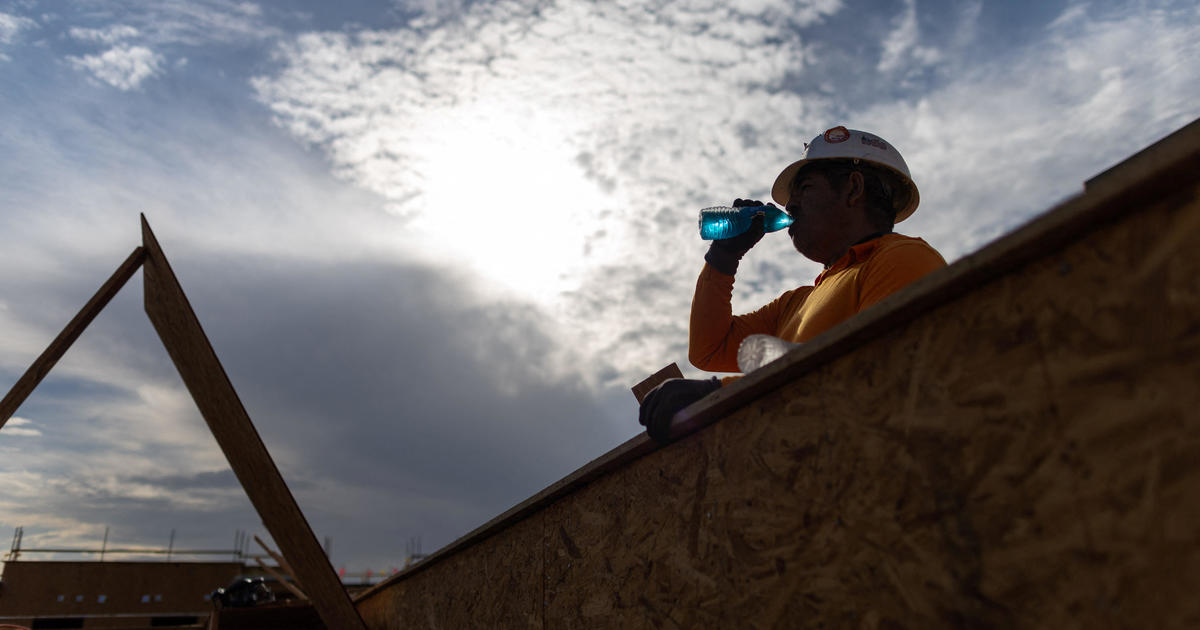Biggest health threats from Hurricane Harvey flooding
In the wake of Hurricane Harvey, as reports of destruction from torrential rains and flooding continue to come in, a number of health hazards put Texas residents at risk.
The deadly storm, which has now been downgraded, forced thousands of people to their rooftops or higher ground, overwhelming emergency workers who could not keep up with calls for help.
Secretary of Health and Human Services Tom Price declared a public health emergency in response to Harvey, and has sent more than 500 personnel and tons of medical supplies to the region.
As the rains continue and floodwater keeps rising, there are several health risks to keep in mind.
Drowning and injuries from floodwater
Floodwater poses a drowning risk for everyone, even for those who are strong swimmers. Swiftly moving shallow water can be deadly, quickly sweeping away anyone and anything in its path.
Experts warn not to rely on a vehicle for protection, as it can be swept away or stall in moving water. Even a big rig truck driver found himself stranded on a Houston street and in desperate need of rescue.
Beware of fallen power lines. Never approach them and report any downed lines to authorities.
Finally, floodwaters may contain dangerous sharp objects such as glass or metal debris, and the uneven terrain beneath the water can be hazardous. Never walk barefoot through floodwater.
"The immediate concern is that somebody's going to be walking and step on something, or not step on something — for instance if there's a manhole cover missing. So people are going to be badly injured walking through the floodwaters," Houston EMS medical director Dr. David Persse told "CBS This Morning" co-host Norah O'Donnell.
Infectious diseases
Floodwater may contain a number of pathogens, and people crowded into shelters are especially vulnerable to outbreaks of common illnesses.
"When we have lots of people congregated into small spaces like this, you worry about viral illness outbreaks that would cause gastrointestinal problems," Persse said. "You know we've always heard about cruise ships where everybody got sick — it's the same virus that we worry about here ... the norovirus."
Exposure to floodwater itself also carries risks.
"Floodwater harbors bacteria, different viruses, and fungi, all of which can make people sick," Dr. Robert Glatter, an emergency physician at Lenox Hill Hospital in New York City, told CBS News.
One of the biggest concerns with floodwater is the possibility of cholera, a highly contagious bacterial disease causing severe diarrhea.
Cholera can spread when water is contaminated with infected feces and then others ingest it, either by drinking the water or consuming food that has come in contact with the water.
While cholera is far more common in third-word countries, Glatter says the possibility of it occurring in Texas "wouldn't be impossible."
"These types of bacteria can live in mixtures of murky water," he said. "It's possible to have this type of infection, especially if the water supply becomes contaminated."
Other infectious diseases that can be passed through floodwater include hepatitis A, typhoid fever, and Leptospirosis, a bacterial infection that can cause muscle aches, vomiting, abdominal pain, and diarrhea.
If the water supply does become compromised, experts recommend only using bottled water for drinking, brushing your teeth, or bathing or boiling water before use. Keep informed about any warnings from local officials about the water supply.
People should also throw away any food that has come in contact with floodwater, even those that are wrapped or packaged in plastic. "There could be microbreaks in the plastic," Glatter said. "There's no way to know if it's been compromised."
Canned food is safe to eat, he said.
Open wounds or rashes exposed to floodwater can become infected and skin infections and conjunctivitis are also common after heavy flooding.
Avoid direct contact with floodwater whenever possible by wearing gloves and waterproof clothing and never walk barefoot through a flood.
"Often if your feet get waterlogged that's a set-up for getting infections, including fungal infections between the toes," Glatter said. "Wear high boots and keep your feet as dry as possible."
Health risks while cleaning up after flooding
If your house becomes flooded during the storm, Glatter says, carpeting and fabric-based furniture should not be salvaged.
"Bacteria can leach onto fabrics and lead to airborne infections," he said. "I would not recommend holding onto anything with fabric that absorbs floodwater."
Hard surfaces that have come in contact with floodwater, including walls, floors, stoves, and countertops should be thoroughly disinfected. Wearing rubber boots and gloves while cleaning homes is important to reduce risk of infection.
Mold is also common after heavy flooding and can exacerbate asthma, allergies, or other respiratory diseases like COPD. Mold can appear in as little as 24 to 48 hours after floodwater recedes.
"Don't touch it. Wear rubber gloves, wear a mask," Glatter said. "Try not to remain in any dwelling where there's mold."
Mosquito-borne diseases
After the rains subside, pools of standing water offer breeding grounds for mosquitoes, which can carry infectious diseases like West Nile and Zika virus.
Glatter recommends draining these pools when you see them and alerting authorities to larger areas of standing water.
Mental health concerns
Less often thought about, but just as important a concern as physical injury, is the mental health impact of a severe weather event like Hurricane Harvey.
Post-traumatic stress disorder (PTSD) is common after a disaster, Glatter says.
"Families might be separated, homes are lost, finances are a big issue," he said. "Many people have a breakdown where they can't focus or handle all of the stress and it puts them at an increased risk of suicidal thoughts."
Glatter said it's important for doctors and health care providers to get ahead of this and screen for mental health issues. Counselors can aid people who are feeling overwhelmed by the damaging effects of the storm.





